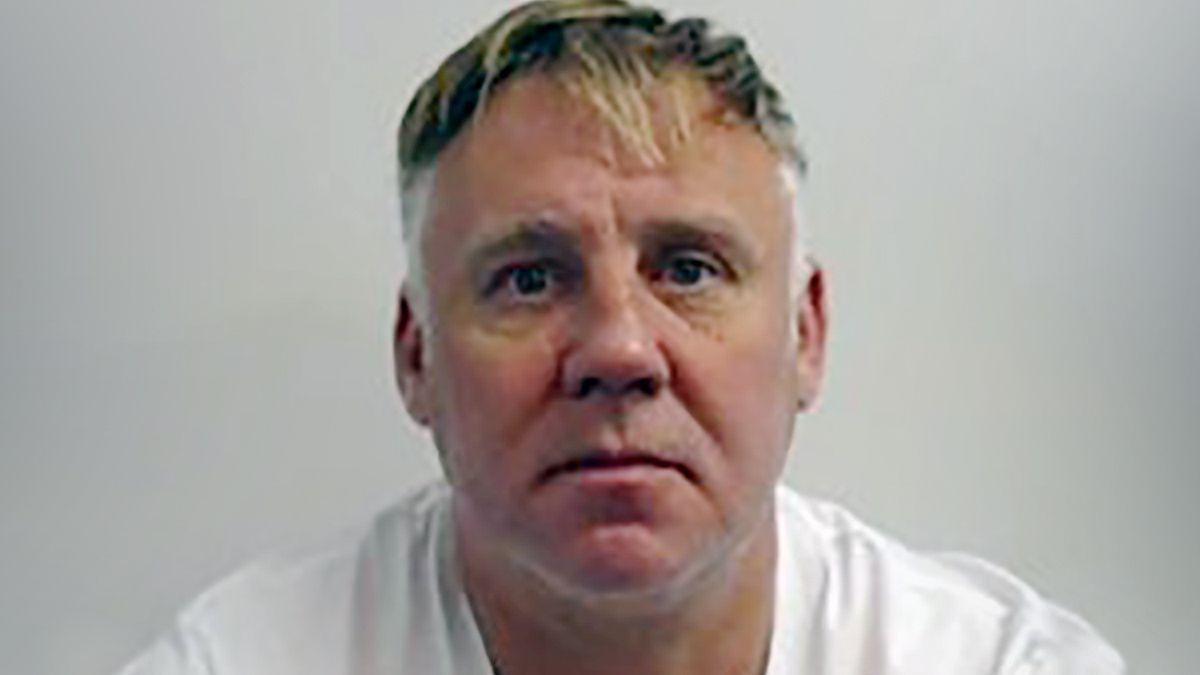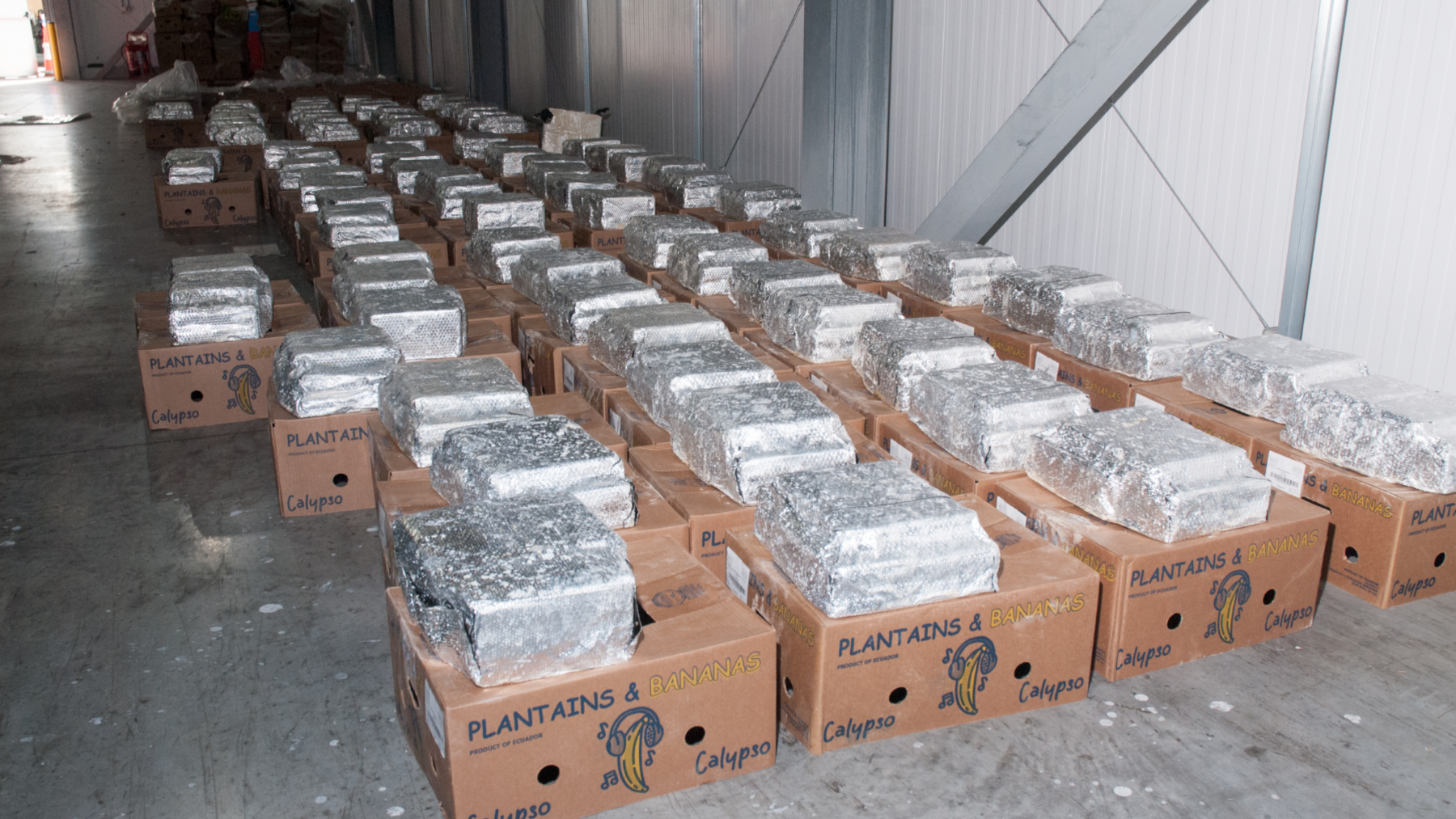Crime boss told cocaine profits would be 'life changing'

- Published
A Scottish gangster who masterminded an international cocaine smuggling operation was told the potential profits would be "life changing".
Jamie Stevenson discussed and planned the scheme on an encrypted messaging platform which was infiltrated by French law enforcement, the High Court in Glasgow was told.
Stevenson, 59, last week pled guilty to trying to import £76m of cocaine from Ecuador stashed inside boxes of bananas before the haul was intercepted by authorities in Dover in 2020.
The judge heard the facts of the case agreed by the prosecution and defence ahead of sentencing Stevenson and five other men in October.
Stevenson, known as 'iceman', initially denied a total of 14 charges but he changed his plea on last week and admitted his role in smuggling cocaine as well as producing and supplying Etizolam - also known as street valium.
Fruit merchant David Bilsland, 68, and Paul Bowes, 53, have also pled guilty to serious organised crime and drug offences.
Gerard Carbin, 45, Ryan McPhee, 34, and Lloyd Cross, 32, pled guilty earlier in the trial.
Appearance of legitimacy
During Monday's hearing, Prosecutor Alex Prentice KC explained the inner workings of the gang.
He detailed how authorities intercepted an encrypted phone network used by the members.
Each man went by a nickname on the chat.
Stevenson used the nicknames "elusiveale" and "bigtastey", while his "right hand man" Lloyd Cross went by the username "shaggygoat".
Glasgow Fruit Market Limited owner David Bilsland was known as "trendymutant".
Mr Prentice told the court: "The operation, as it developed, involved cash being provided by Stevenson, Cross and others to fund Bilsland's apparently legitimate imports.
"Messages show Stevenson discussing with Cross the importation of kilo blocks of cocaine, the use of Bilsland and his business experience and contacts to provide an appearance of legitimacy."
Bilsland mainly messaged Cross, who passed on his boss Stevenson's instructions.
"In a further discussion, Stevenson discussed the 'wages' he expected to receive from the importation arrangement," Mr Prentice continued.
Regarding the money he stood to make, an unknown associate told Stevenson: "That's life changing work."

The court heard Stevenson, from Rutherglen in South Lanarkshire, and Cross became wary of customs checks on the banana consignments.
Bilsland tried to ease fears, telling Cross in one message: "I am on it. [I'll] keep you posted."
He later said there were "lots of wee issues" adding: "But, that's what I am here for."
In another message, Bilsland said: "I am very happy with the plan so far. Let me know if that is okay with you."
Cross replied: "All sounds absolutely perfect mate. You are doing some top work."
"Thanks. You too. We are all a team. Will give you update on Tuesday. Have a good weekend," Bilsland said.
The prosecutor said one of Bilsland's primary roles was to engage in communication with the shipping lines, port authorities and others involved in the logistics of legitimate importation.
Scotland's 'Tony Soprano' smuggled cocaine in banana boxes
- Published29 August 2024
Scottish fugitive among UK's 12 most wanted
- Published19 January 2022
Three-day search found tonne of cocaine in banana boxes, court told
- Published26 August 2024
The bust at Dover occurred in 2020, during which 119 packages of cocaine were concealed in boxes of bananas from Ecuador, addressed to a fruit merchants in Glasgow.
The drug operation spanned the UK, Spain, Ecuador and Abu Dhabi.
Following the bust, the home of Bilsland and other addresses connected to Glasgow Fruit Market were raided.
Bilsland told a colleague that he had been "stupid" and was "going to jail for a long time".
Stevenson was arrested on the same day in Glasgow, he was later bailed and fled the country. He was found and arrested two years later while jogging in the Netherlands.
Judge Lord Ericht deferred sentencing for all six men until next month.